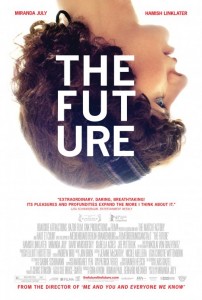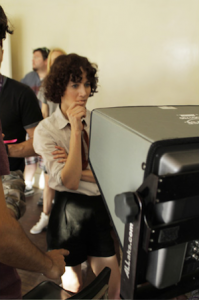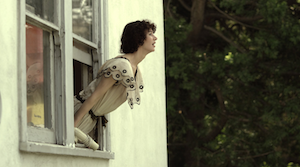 Miranda July has certainly taken her time following up her breakout indie hit, Me And You And Everyone We Know, and when she finally did she made sure to bring something unexpected. In our brief chat I was able to find out some interesting details on her development process, and how the “quirk” and humanism of her kind of film manages to survive an often ruthless logistical process of low-budget filmmaking. We get into her relationship with the craft of the process, and just how did she decided on including a talking cat character that is seen only as a pair of paws…
Miranda July has certainly taken her time following up her breakout indie hit, Me And You And Everyone We Know, and when she finally did she made sure to bring something unexpected. In our brief chat I was able to find out some interesting details on her development process, and how the “quirk” and humanism of her kind of film manages to survive an often ruthless logistical process of low-budget filmmaking. We get into her relationship with the craft of the process, and just how did she decided on including a talking cat character that is seen only as a pair of paws…
Renn: I’ve seen you discuss the fact that The Future was born of a series of performances and participatory improvs you did on stage, and that you were aware that a film might ultimately result. Did knowing that affect how you developed or workshopped the theatrical show?
Ms. July: Um, no, only in the sense that I documented it all really heavily, in a way that I might not have if I hadn’t been really interested in what was gonna come next. But the truth is, I thought the movie that I would make would be so much more avant-garde, and maybe it would have audience participation itself. So I thought it would be much more like the performance when I was working on the performance, and then I totally took off from there.
Renn: So when you reached the place of translating this documentation and experience into a screenplay, were there any unexpected challenges, or did it flow very naturally into that format?
Ms. July: Well, it was a whole, you know, epic… like writing any other script in a way, there were these clues. There were certain things that took me a while to figure out that there was no way they could be in the movie. For example, there was a point in the performance where all the men in the audience have a conversation with all the women in the audience, and I did this by having them read lines in unison from a screen, and I though, “okay, in the movie there can be a part where all the women in the world can talk to all the men in the world in unison,” which I still kind of like the idea of, but just budget-wise alone… uh, yeah, that would just be impossible, and ultimately not emotionally necessary in the way a lot of other surreal things held their own through to the end.
Renn: I’ve seen that with your last film you were, during editing, in an emotional place that was very different than the tone of what you were working on, which affected what you wanted to do next. So when you set out to write something, do you have a specific tone you’re attempting to write for and achieve, or do you simply write and a tone develops?
Ms. July: It’s funny, that tone, which is still just the tone and not even the plot or anything, is something that I seem to know/have a sense of really early on and doesn’t change. I remember with the first movie, picturing this sort of… “kaleidoscopic” was the word I had in my head, you know? Not just many characters but many colors and it was a feeling in me also, this kind of bursting, colorful, wide world. And with the new movie, yeah, I could picture this… darker…. more of a solid single object like a monolith or something. In both cases that thing stayed the same, but all the details changed along the way.
 Renn: So how do you end up reconciling that tone you’re trying to capture with the sheer logistics of making a low-budget, short-scheduled film, especially consider your films tendency towards the organic and the human?
Renn: So how do you end up reconciling that tone you’re trying to capture with the sheer logistics of making a low-budget, short-scheduled film, especially consider your films tendency towards the organic and the human?
Ms. July: Well, I mean, they’re highly scripted. They’re organic in how the scripts are written, but once it’s down there’s not a lot of experimentation that happens on the set. We’re kinda just running through it, and I think just the fact that I just have a very very clear idea of how I want each line said, each scene to feel… it may not be the most fun process, and frankly I would kind of love to work another way, but with that budget it kinda works. The actor are amazing and obvious I would be lost without them and what they’re doing, but I also like- in a pinch I’ll give a line reading, I don’t care. It’s just like, we have to get through it the way I pictured it. So yeah, there’s probably not as many happy accidents in a way that I wish, but the good thing is that the whole thing doesn’t end up being an accident or trainwreck.
Renn: So if things are pretty clearly planned out, how do go about deciding how you’re going to visualize these things? Do you storyboard? How does your visual directing style fit into your process?
Ms. July: Yeah, I’m not like… Hitchcock or something, I think where I put- I just can’t be that meticulous partly because of the time and partly because I’m in it, and I have to trust the D.P. a lot, I have to hire someone who is on the same page, and then not be super controlling. And also, frankly, I probably just don’t care about that stuff quite as much as a lot of directors would, who would fuss more. I’m putting all my attention on the story and getting that ready, the feeling and the story. Which again, is something that I can feel there’s massive room for growth there, but at this point with the two movies… This last one was a 21 day shoot. I learn what I can over the course of it about shooting, but I can feel it, “gosh, there’s so much I could try,” if I could also just take time to be on the other side of the camera more, but yeah.
Renn: Your cinematographer has a long history in documentary filmmaking. Did that play a part at all in your decision to hire him?
Ms. July: I hired him because I really admire this German filmmaker Maren Ade, and just the things she said about him. In fact, the movie the he shot of her’s didn’t actually look that good in the sort of classically beautiful sense, and she said that he hated how it looked and that she had forced him the whole time to make it ugly–like that’s what she wanted, it was kind of like a punk thing for her–and he was sort of horrified, but it was remarkable to me that in the end she was the director and that he went along with that was pretty meaningful to me. Because there is always that question with a woman filmmaker, a guy D.P., you just kind of wonder with a stranger, how is this balance of power going to work out? So that was a pretty extreme vote of confidence in him for me.
Renn: Sound is a big part of this film, but you mentioned earlier putting a great deal of trust in the craftsmen around you. How does that extend to post, and your relationship with your editors and sound designers?
Ms. July: I love all that stuff and when we finally get to that point I sit there with everyone until it’s done. I don’t get up, every day I’m there all day with the editor. I guess to me it always feels a little bit more like writing, which to me is comfortable and there hasn’t been with either movie any super-radical reshuffling of stories, but endless little stuff… I guess I get pretty involved in rhythm and timing, and with that it’s sort of a finer and finer grade of sandpaper, at the very end. And then the sound design, yeah, I was sort of always surprised by how incredibly opinionated I am in that department. It took me a while to realize, oh, the very first things I made when I was 20 were albums, and those albums were radio-plays essentially, performance albums but all sort of soundscapes and I realized I’ve been doing this particular thing–this world of recording sound–for so long that I’m not quite as intimidated as I might be about working with experts in other areas, so I really love that part and get in there. And this one had a lot of fun things too, like the sound of the ocean restarting after being stopped- I can’t claim any credit because I had a great sound designer, but it was enjoyable yeah.
 Renn: To dive into the film’s content a bit: you’ve said Paw Paw the cat is largely a mechanism to get the audience away from the main characters for a little while, but in terms of visually presenting this talking cat character, how did you plan that out?
Renn: To dive into the film’s content a bit: you’ve said Paw Paw the cat is largely a mechanism to get the audience away from the main characters for a little while, but in terms of visually presenting this talking cat character, how did you plan that out?
Ms. July: You know it’s already kinda pushing it, this talking cat, and I thought that the least we can show of that cat, probably the more elegant it’s going to be. If the audience is sort of culpable in the sense that they’re the ones that make it real by believing in it even though it’s just these paws and this voice, and they putting it all together in their head. That was a way of not just handing over this fully formed cartoon cat, but have it exist a lot in the minds of the audience members. And also, when you start thinking of ways to have a cat’s mouth move, that was just a whole mess I was happy to avoid, and never even considered frankly.
Renn: So to what extent do you let in critical responses to your work, and how do you process them for any of your work- stage, screen or otherwise?
Ms. July: I’m not the kind of artist that doesn’t care what people think. I’m so engaged in the audience–probably because of my live performance background–and I want to know if it’s connecting or if I’m engaging with people in what way. So there is a period of time after it comes out when I’m pretty hungry for that, and I do read stuff certainly, like the first reviews and stuff. Then really quickly your realize it all becomes repetition after a certain point. You know, I’m sure there are some people that say new things, but for the most part there are sort of “the points of view” and once you figure out what they are, you figure out what the ride is going to be for this particular movie and then I stop, and I have to move on.
Renn: So, from where you sit, how did you categorize the response to The Future? Did you get the sort of range of responses that you were looking for?
Ms. July: Right yeah, well I was so aware that I was making a sadder movie, a less crowd pleasing movie, and that was the choice. I think that’s sort of instinct when you feel you’ve done one thing and you sort of react against it. So I was kind of prepared to have, what I saw in my mind as pretty much the opposite experience that I had last time, and it was a great to see that it was not opposite, it’s just totally different, and in a way I guess I felt really pleased, like I’d been allowed to move on and to grow. Like the people that were interested in this one seemed like interesting people to me? And the conversation felt more complex and more intense to me, it felt like I’d moved on. And there was maybe both more respect for me as a filmmaker, not just a random person that had come out of nowhere and was maybe got lucky or something, and they had more respect that I was conscious of what I was doing, and had actual craft and stuff. So that comes from, probably a more cinephile group of people, and then certainly the broader world I completely, you know, probably left behind or confused. Like a good portion of people who were just waiting for the poop joke or whatever. Which was probably, conscious or not, my intention. That also was kind of satisfying to me, that sort of… the negative felt appropriate to me, and what you fear is that there are going to be negative responses from the very people you would think would most appreciate it, and that didn’t happen.
The Future is available on DVD right now.
Twitter
Comment Below
Message Board